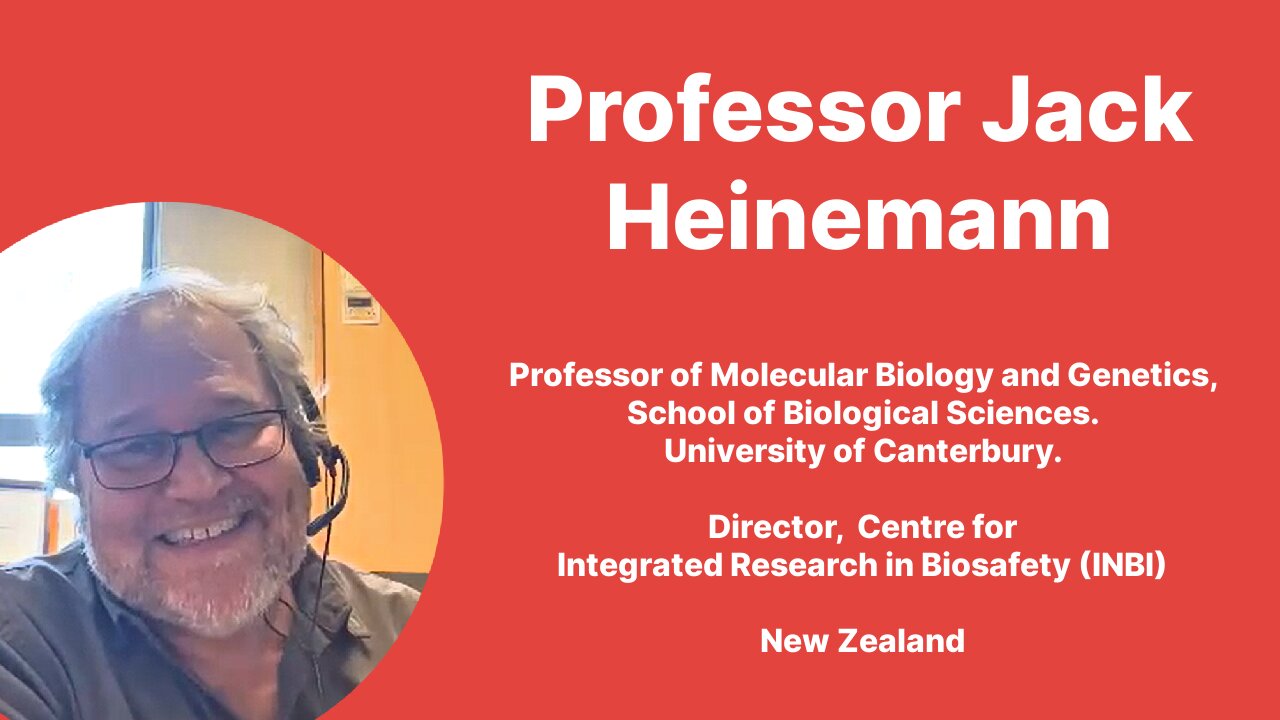Premium Only Content

Biotechnology - Risk that scales up as efficiency increases. Heinemann on risk management & policy.
Professor Jack Heinemann PhD Molecular Biology (Oregon), BSc(hons) Biochemistry and Molecular Biology.
Professor of Molecular Biology and Genetics, (School of Biological Sciences). University of Canterbury. Director, Centre for Integrated Research in Biosafety (INBI) UC.
This interview is essential viewing for scholars, scientists & policy-makers interested in ethics, biotech, policy & the stewardship of biotech. Have you ever wondered about the ways new biotechnologies are speeding up, the efficiency of production increases, which inevitably increase tech output into the environment? How then do we judge risk? The product is a hazard - but how do we identify the potential for a hazard (the product) to cause harm?
Harm is a complex equation of the potential to cause harm [x] where a technology can cause harm. Risk is not the same as hazard. This is why risk assessment is so important. The potential for risk to scale up, what happens at scale - the scale gearing - is key.
As Heinemann notes 'Where harm can accumulate at scale transition, that's precisely where regulation is a solution to mitigate risks... if we say the technique is inherently safe & no product has to be regulated, then I can use those techniques out in the field. By deregulating the hazard, which is the organism I intend to change, unless you have commensurate regulations on the process, you deregulate when & how people use these techniques.'
This really important issue with Professor Jack Heinemann discusses complex scientific, & ethical issues critical for stewardship of biotech, including common assumptions & the dilemma of tech promises. It contains insight that can help look at risk with other, non-biotech technologies. These issues are often neglected in public discussions. Yet how we steward technology impacts the potential for benefit or harm. The case study of null segregants forms an important background to the discussion.
Paper under discussion: Heinemann JA, Clark K, Hiscox TC, McCabe AW and Agapito-Tenfen SZ (2023), Are null segregants new combinations of heritable material and should they be regulated? Front. Genome Ed. 4:1064103. doi: 10.3389/fgeed.2022.1064103
Professor Heinemann was interviewed by JR Bruning (sociologist) of Physicians & Scientists for Global Responsibility (PSGR), a New Zealand based charity, in January 2023.
For more interviews of scientists & doctors, please go to PSGR.org.nz
-
 3:45
3:45
BIG NEM
7 hours agoDiscover Your Ikigai: Finding Your Ultimate Purpose
1.73K1 -
 13:19
13:19
Dermatologist Dr. Dustin Portela
1 day agoDo You Have Sebaceous Filaments or Blackheads?
1.5K1 -
 2:21:35
2:21:35
Price of Reason
10 hours agoThe Establishment WORRIES about Elon Musk AGAIN! Superman Trailer Discussion! Sonic 3 Review!
36.3K2 -
 1:14:54
1:14:54
Steve-O's Wild Ride! Podcast
14 hours ago $13.42 earnedZac Brown Reveals The Secrets To HIs Success - Wild Ride #247
46.8K12 -
 4:16:43
4:16:43
JdaDelete
8 hours ago $10.37 earnedProject Zomboid with the Boys | The Great Boner Jam of 2025
29.4K -
 6:00:08
6:00:08
SpartakusLIVE
8 hours agoYoung Spartan STUD teams with old gamers for ultimate BANTER with a SMATTERING of TOXICITY
23.9K -
 1:50:39
1:50:39
Kim Iversen
10 hours agoShocking Proposal: Elon Musk for Speaker of the House?! | IDF Soldiers Reveal Atrocities—'Everyone Is a Terrorist'
69.3K162 -
 43:27
43:27
barstoolsports
13 hours agoOld Dog Bites Back | Surviving Barstool S4 Ep. 9
125K3 -
 5:13:04
5:13:04
Right Side Broadcasting Network
7 days agoLIVE REPLAY: TPUSA's America Fest Conference: Day One - 12/19/24
178K28 -
 1:06:01
1:06:01
Man in America
1 day agoPfizer Has Been Caught RED HANDED w/ Dr. Chris Flowers
56.9K15